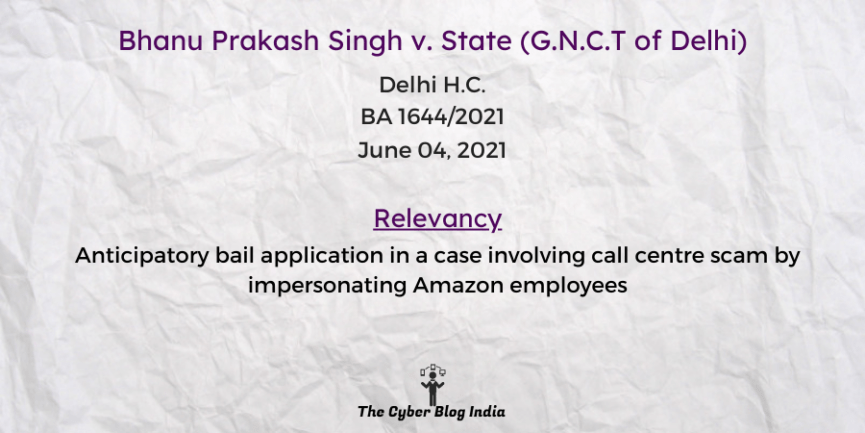Bhanu Prakash Singh v. State

Bhanu Prakash Singh v. State (G.N.C.T of Delhi)
In the High Court of Delhi
BA 1644/2021
Before Justice Mukta Gupta
Decided on June 04, 2021
Relevancy of the Case: Anticipatory bail application in a case involving call centre scam by impersonating Amazon employees
Statutes and Provisions Involved
- The Information Technology Act, 2000 (Section 66C, 66D)
- The Indian Penal Code, 1860 (Section 419, 420, 120B, 34)
Relevant Facts of the Case
- The petitioner was leading a group of 15 accused persons working at a call centre. They posed as Amazon workers saying that suspicious transactions were taking place from the victims’ accounts.
- They persuaded the victims to grant access to their devices via AnyDesk. Further, they tricked the victims into buying gift cards through their Amazon-linked ATM cards claiming that to be the verification process.
- After that, they persuaded the victim to log in to their internet banking under the pretext of getting the refund. In this manner, they came to know the banking credentials and transferred money to the accused’s cryptocurrency Zelle accounts.
- The accused would send an email to the victim informing them that the refund is complete. In turn, the victim would give the gift card number.
Prominent Arguments by the Advocates
- The petitioner’s counsel argued that the petitioner is not concerned with fake call centre. He further relied on Arnesh Singh v. State of Bihar (2014) 8 SCC 273 to argue that accused who are not required for interrogation should be not arrested.
- Also, the petitioner is suffering from serious ailments. Hence, the court should not keep him in custody.
- The respondent’s counsel submitted that the petitioner is the kingpin of this call centre scam. All other accused persons were taking instructions from him. Custodial interrogation is necessary to find the source of accounts used to cheat the victims.
Opinion of the Bench
- The punishment may only extend up to 7 years but the offence is of a great magnitude. There is also enough prima facie evidence to prove that the petitioner was giving instructions to the rest of the accused persons.
- The Bench further held that the medical documents submitted are not recent. Moreover, they do not show any co-morbidity to COVID-19.
Final Decision
- The bench rejected the anticipatory bail application.
Marc Pereira, an undergraduate student at Rizvi Law College, Mumbai, prepared this case summary during his internship with The Cyber Blog India in January/February 2022.
